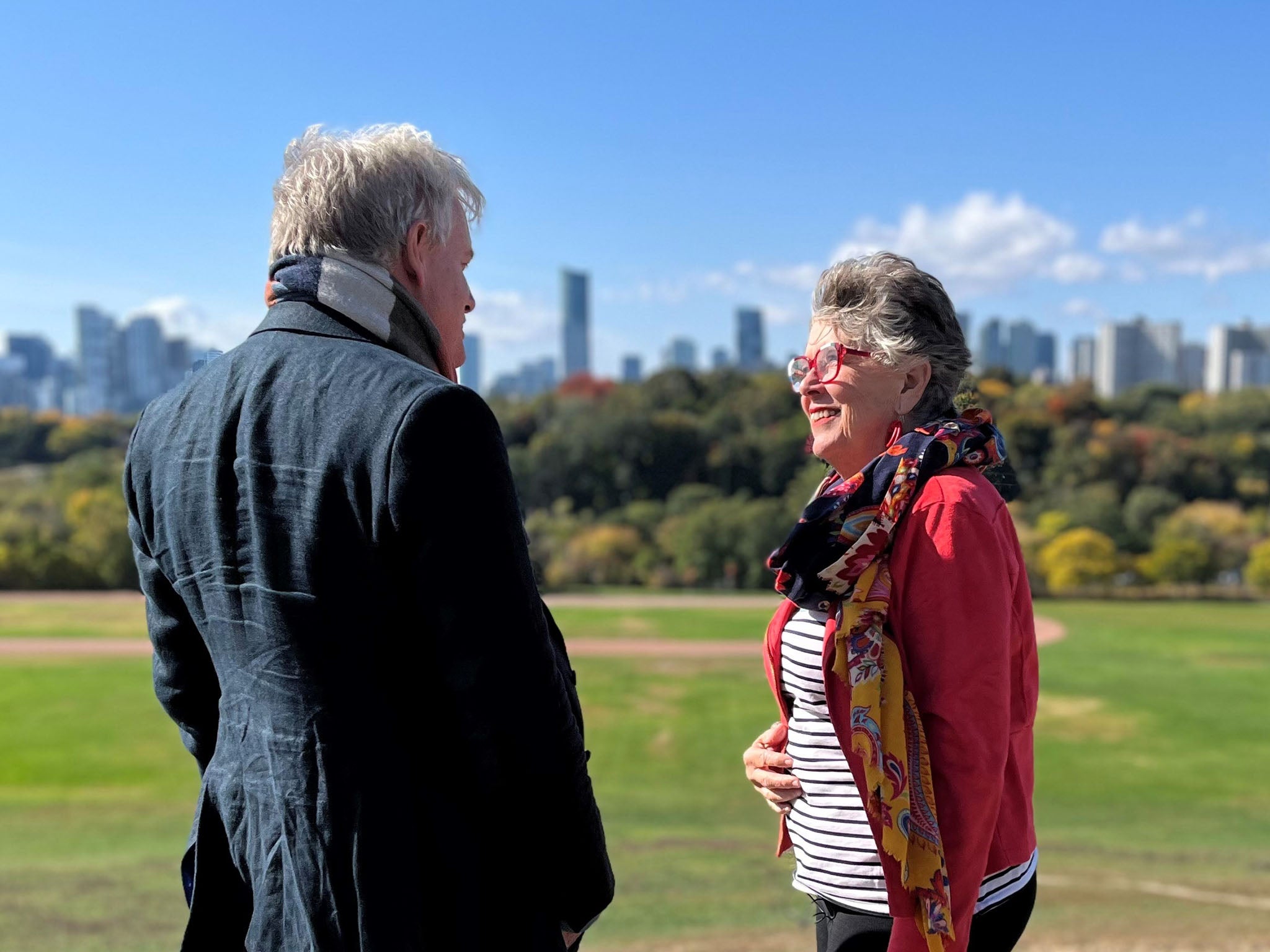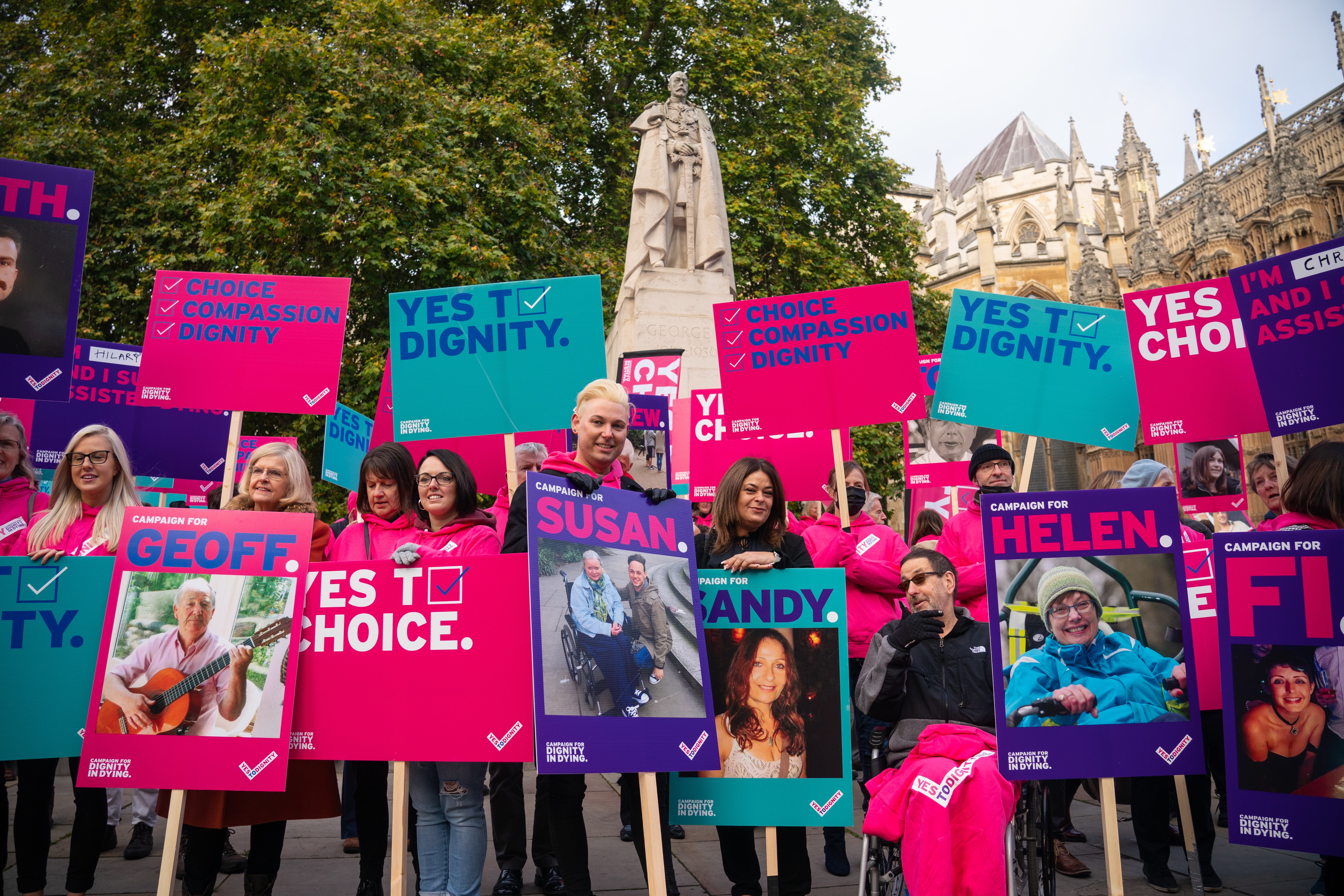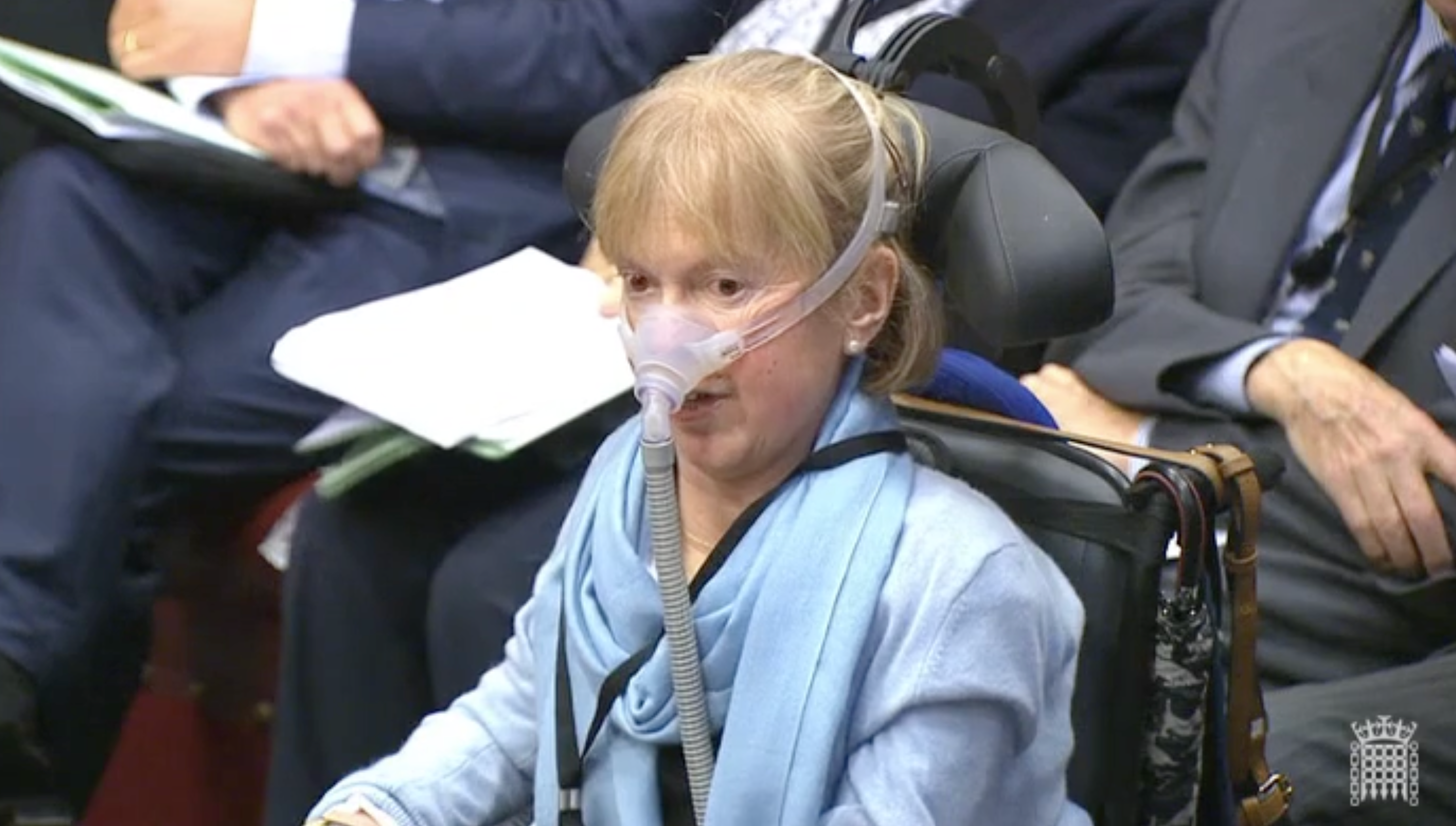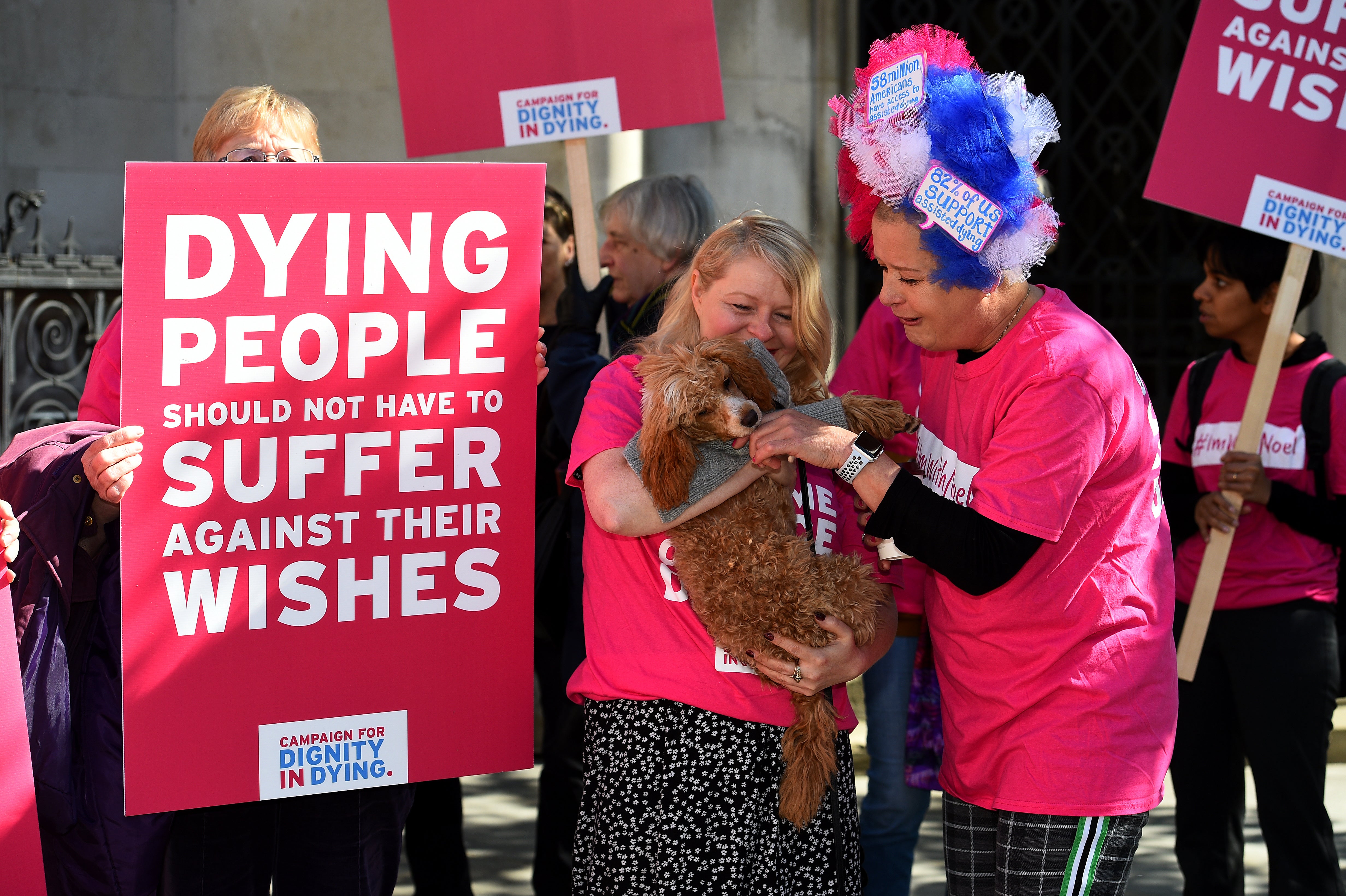
Even now I get, ‘Oh you’re not very well today’ as if I’m on the cusp of dying all the time. But my arguments speak for themselves. They’re there in Hansard. I get invited on to big committees now.”
I’m speaking to Not Dead Yet UK (NDY UK) founder Baroness Jane Campbell in a meeting room around the corner from her office in the House of Lords, and she’s on a roll. Two wheelchair users in the same room in the Palace of Westminster. That’s not an everyday occurrence even in the Lords, whose members are from an older demographic than the Commons.
Disabled people aren’t well represented in that corridors of power. Thanks to the baroness, they have a powerful voice. Her punches are ventilator-assisted, but they are as powerful as a heavyweight’s.
She’s made a career of beating the odds. She grew up in southwest London where her mother, Jesse, was a window dresser in a gown shop and her father, Ron, was a heating engineer. At nine months, she could not hold her head up and exhibited little movement at the age of one. A referral to Great Ormond Street followed, leading to the diagnosis of her spinal muscular atrophy and a prediction that she would not live past her second birthday. Her doctors were proved wrong – and how.
Not much was expected of disabled children at the time, but she overcame that too, achieved O and A-levels and moving on to Hatfield Polytechnic then Sussex University, where she took an MA with a dissertation on Sylvia Pankhurst. A successful career in local government followed, climbing a ladder that is all too often made treacherous and slippery for disabled people. Her CV includes stints with the Equality and Human Rights Commission and the National Institute for Social Work.
In 2007 Jane Campbell became Baroness Campbell of Surbition and, now 63, she has spent the past 15 years campaigning among the House of Lords’ red benches. It would be an impressive work history for anyone – you don’t get to those places without being able to call upon an impressive font of energy. It’s still there.

“When you present as I did about six years ago, having to wear a ventilator, it was as if that was it [in the minds of parliamentarians]. I should have been in intensive care because the only people they’d ever seen like me were in intensive care or were very, very sick, or at the end of their lives. It took them a couple of years to not be afraid of me.
“To get to this point, I had a lot of fights along the way. The worst one was when they wouldn’t allow me to bring a personal assistant to the chamber because no commoner had been across the bar since 1725 and that was a tradition, and if they gave me a PA then other people might want one. It was seen as a disproportionate benefit.
“I had to take my time explaining to them what a reasonable adjustment was. In the end I said look, here’s the Equality Act, here are the areas that explain why nobody else will get the same provision. Grow up.”
I have the right support. Without it, you’re without hope. You’re a burden on those that you love, because even if they love you, it’s hard work. You want your freedom. You need that support
Grow up indeed. But when one hears what she is still subjected to – the sort of arguments that she is forced to listen to – it is quite clear there is a lot of growing up still to do.
NDY UK campaigns against assisted suicide – Campbell opposes the term “assisted dying” because she says it seeks to soft-soap what having a doctor or someone else help someone end a life actually involves.
It has been much in the news of late. The Commons Health and Social Care Committee recently launched an inquiry. Bake Off presenter Prue Leith debated the issue with her son Danny Kruger, a Tory MP, last month on Channel 4’s Prue and Danny’s Death Road Trip.

The Lords knocked down the last attempt to change the law when it came to a vote in 2015. But it is backed by a well-funded, well-staffed campaign fronted by Dignity in Dying.
NDY UK, by contrast, has Campbell’s part-time parliamentary researcher Zeynab Al-Khero working for it for a couple of days a week. There’s enough in the kitty to fund her salary for two days a week until the summer.
“They love that,” the Baroness harumphs. There is a committed board led by disabled people. This is an organisation that holds to the rallying cry “nothing about us without us”. But Campbell confesses: “We could really use some more money.”
Of course, one thing in NDY UK’s favour is Campbell herself. She is a formidable advocate, not just on assisted suicide but when it comes to disability rights more generally.
The former represents a big problem; it could turn into a dangerous infringement of the latter: “[Assisted suicide] is very scary to disabled people in this country. We depend on our doctors, on our caregivers, to give us help and support to live. To have faith in our lives because that helps us to have hope and enables us to encounter and overcome the barriers we have in our lives.
“From the moment you get up you’re wondering if the PA is coming. You’re thinking, am I going to be able to get on public transport? Is the pain going to be overwhelming because I haven’t got decent pain relief because I’m not seeing a doctor who thinks I’m worth bothering about?
“I’m alive today because I have had the best possible medical interventions to keep me alive with a progressive impairment. I should have died when I was 30. Now, in April, I’m going to celebrate my 64th birthday. I’m one of the oldest people living with spinal muscular atrophy, and that is because I have organised my care, campaigned for my care and fought for my care throughout my life and because technology has kept up with me.
“Ventilators are now small. I don’t have to lie in a hospital bed, or be in an iron lung. I can zoom around the corridors of the House of Lords and get to my meetings long before most of my colleagues. But I have the right support. Without it, you’re without hope. You’re a burden on those that you love, because even if they love you, it’s hard work. You want your freedom. You need that support.”

Campbell fears what will happen to those who don’t have that support, who lack the advantages that come with a position of power and influence, or who might not be as articulate as she is.
“We don’t live in a society that is that kind to disabled people,” she says, which is a sentiment most disabled people would agree with.
Campbell worries about the reductive assumptions made about disabled people by doctors will get caught up in the assessments they will make of those seeking assisted suicide if it is legally enshrined. She argues that what is dressed up as a matter of “choice” is no choice at all.
“It is a false dichotomy. In order to have choice, you have to have something to choose between. At the moment you either choose between assisted suicide or really bad support from a social care sector that’s in crisis so we’re not getting it. The NHS, it’s in crisis too. There aren’t enough nurses to support people with disabilities in hospital. Pain management and palliative care is insufficient. Get that right first, then we’ll sit around the table and talk – but not before.”
I bring up the case of Canada, which is becoming the poster child for an ostensibly liberal policy gone badly wrong; a place in which veterans struggling to secure support have been offered assisted dying.
“Canada has been a situation of rapid development from when Maid [Medical Assistance in Dying] was strictly limited to people with terminal illness. It only took five years for that to be whittled away, so you have being a burden, being in pain, feeling you don’t have anything to live for starting to creep into the criteria. Well, that was a red flag to us at NDY UK; that coupled with the rise in numbers from year one, from about 2,800 to more than 10,000 by 2021.

“Now, James, this was not new to me,” she says, catching my eyes and holding them in a vice-like grip. “I’d already been watching developments in the Netherlands. I’d met with a doctor in the Netherlands who said on the first occasion [they had helped someone end their life], ‘I was awake all night, I agonised over it, it really played on my mind when I did it. On the second, I took my time to, you know, think about it; on the third, it was a piece of cake.’
“The third time I did it was a piece of cake. Think of how dehumanising that is. Now think too, busy doctors on busy wards? You’re going to find two doctors to put their name on the piece of paper fairly easily. It becomes routine. This is the product of lazy thinking. This is the unintended consequence.”
That story is indeed chilling. So is the story of another doctor Campbell relates: a man who suffered a spinal injury through playing rugby and took three years to adjust, having had suicidal thoughts during that time. Those thoughts are quite common to people who have suffered life-changing accidents, as I can testify after having my own life brutally altered through being run over by a cement truck.
I went into my local hospital where nobody really knew me and the consultant said, well with her obvious condition – he wasn’t talking about my pneumonia – she wouldn’t want to be resuscitated
“He said to me if this [assisted suicide] had been around, I would have definitely gone down that road. It has taken me a long time to change my life. Now he lives in a £2.1m flat and occupies a senior role in healthcare. Well, come on. That’s not bad. But it takes time. It’s a process.”
Disabled lives don’t matter to many in Britain. But as much as I can tell horror stories about what has happened to me since waking up in a druggy haze to a new reality, they pale by comparison to hers.
Campbell had a “do not resuscitate” order placed on her by a hospital without her permission. Twice.
“I went into hospital with very serious pneumonia as I have many times before, and in those circumstances I have to be cared for in ICU or high dependence unit and have a line put in. I do go down fast, and on this occasion, I went into my local hospital where nobody really knew me and the consultant said, well with her obvious condition – he wasn’t talking about my pneumonia – she wouldn’t want to be resuscitated. We will give her antibiotics and hope for the best.

“Fortunately my husband [Roger] was with me, because I was out of it. He said, ‘What are you talking about? She’s just got a doctorate. She’s running a huge research institute,’ and they kind of went, ‘Oh’. They were working on a set of assumptions about my diagnosis and what I looked like.
“Then they did it again when they took me up to the ICU. Of course I complained. I’m not Jane Campbell for nothing.”
No she’s not. She knew the chief medical officer for England at the time, resulting in a video sent around every hospital that bosses were told to watch and formulate better policies. Yet when Covid struck, disabled people were once again pushed to the back of the queue when it came to triage, sidelined into palliative care when others were being treated.
“They don’t listen,” Campbell says, frustrated. “Sometimes I do feel like giving it all up. I have a life to lead, I’ve friends, a husband, a godchild. I like to party. I’m having my birthday party on coronation day. There’ll be a barbecue and wine outside and the TV will be on inside for those that want to watch it. The choice will be theirs.”
It sounds like a blast. Mercifully, I don’t think Campbell will give it up. She wouldn’t want to give her opponents the satisfaction.







